5 Music Reviews
by dave heaton
7L & Esoteric, DC2: Bars of Death (Babygrande)
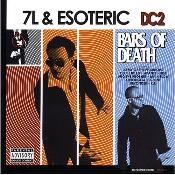 DC2: Bars of Death, the new album from Boston hip-hop duo 7L & Esoteric, is nominally a sequel to their 2002 album Dangerous
Connection; its cover art continues this notion of sonic cinema,
with "co-starring" credits for guest MCs and a striking, retro fashionplate
design. For the album's music, DJ/producer 7L seems to have taken the
idea of the album as a soundtrack to a long-lost 70s heist film and run with
it - starting with a brief opening instrumental theme that'll have you
thinking of Kill Bill and its varied predecessors, the album is filled
with very cinematic sounds that are rooted in 60s rock and 70s funk & soul
but carry with them a heightened presence and drama that's straight up
Hollywood. The pleasures within the musical backdrop form a lengthy
list,
from the Hendrix-ish guitar forming a horror-movie setting on "Ring
Music"
to the spooky soul-jazz of "This Is War." In fact, if DC2 were
an
instrumental album, I'd probably be praising it to high heaven as a
brilliant
composition built from the imaginary soundtracks of yesteryear.
Unfortunately, though, the album is overloaded with well-meaning but
unremarkable rhymes from Esoteric and pals (Celph Titled, Apathy, Main
Flow,
and more). Though there's a few sharp political barbs and some decent
storytelling (like the "in a videogame" tale of "Graphic Violence"),
most of
it is macho exercises in rhyming for rhyming's sake. It's an approach
I
respect - that no-holds-barred, stripped-down approach - but the
execution
is mundane. There's simply nothing about Esoteric's voice, rhyming
style, or
lyric-writing that's anywhere near unique. And while a plain,
straightforward style can be admirable, here it's exhausting. By the
album's
end, I wanted to shout "quiet in front, I'm trying to watch the
movie..."
DC2: Bars of Death, the new album from Boston hip-hop duo 7L & Esoteric, is nominally a sequel to their 2002 album Dangerous
Connection; its cover art continues this notion of sonic cinema,
with "co-starring" credits for guest MCs and a striking, retro fashionplate
design. For the album's music, DJ/producer 7L seems to have taken the
idea of the album as a soundtrack to a long-lost 70s heist film and run with
it - starting with a brief opening instrumental theme that'll have you
thinking of Kill Bill and its varied predecessors, the album is filled
with very cinematic sounds that are rooted in 60s rock and 70s funk & soul
but carry with them a heightened presence and drama that's straight up
Hollywood. The pleasures within the musical backdrop form a lengthy
list,
from the Hendrix-ish guitar forming a horror-movie setting on "Ring
Music"
to the spooky soul-jazz of "This Is War." In fact, if DC2 were
an
instrumental album, I'd probably be praising it to high heaven as a
brilliant
composition built from the imaginary soundtracks of yesteryear.
Unfortunately, though, the album is overloaded with well-meaning but
unremarkable rhymes from Esoteric and pals (Celph Titled, Apathy, Main
Flow,
and more). Though there's a few sharp political barbs and some decent
storytelling (like the "in a videogame" tale of "Graphic Violence"),
most of
it is macho exercises in rhyming for rhyming's sake. It's an approach
I
respect - that no-holds-barred, stripped-down approach - but the
execution
is mundane. There's simply nothing about Esoteric's voice, rhyming
style, or
lyric-writing that's anywhere near unique. And while a plain,
straightforward style can be admirable, here it's exhausting. By the
album's
end, I wanted to shout "quiet in front, I'm trying to watch the
movie..."
Auburn Lull, Cast From the Platform (Darla)
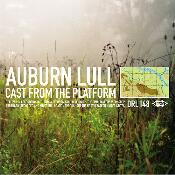 Much like their first, equally gorgeous album Alone I Admire, the new album from Auburn Lull wraps a cloud of dreamy melodies and atmosphere around you and floats along gently. More so than that album, though, here I'm continually aware of the intimate, sweet and often sad songs that live inside the moods. I hear many of these songs twice at once - as expansive, all-consuming soundscapes created by a band and as close-up, solitary ruminations. And in both cases they project the feeling of absolute, peaceful stillness and the sense that everything's always in motion and nothing's dependable. With textures that float and shift and wander, plus song titles like "Direction & Destination," "Sinking Meridian," and "Seaforth," Cast From the Platform sublimely evokes thoughts and feelings on one's sense of place, of time, of home. Meanwhile, the music - dream-pop paintings that at various times hint towards dub reggae as much as they do the history of ambient music, casts a glow over you that's hard to shake (and why would you want to?).
Much like their first, equally gorgeous album Alone I Admire, the new album from Auburn Lull wraps a cloud of dreamy melodies and atmosphere around you and floats along gently. More so than that album, though, here I'm continually aware of the intimate, sweet and often sad songs that live inside the moods. I hear many of these songs twice at once - as expansive, all-consuming soundscapes created by a band and as close-up, solitary ruminations. And in both cases they project the feeling of absolute, peaceful stillness and the sense that everything's always in motion and nothing's dependable. With textures that float and shift and wander, plus song titles like "Direction & Destination," "Sinking Meridian," and "Seaforth," Cast From the Platform sublimely evokes thoughts and feelings on one's sense of place, of time, of home. Meanwhile, the music - dream-pop paintings that at various times hint towards dub reggae as much as they do the history of ambient music, casts a glow over you that's hard to shake (and why would you want to?).
Old 97's, Drag It Up (New West Records)
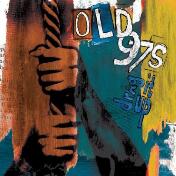 Drag It Up starts off with an old-fashioned country-rock stomp that'll have you thinking the Old 97s are looking backward to some of their earlier albums for inspiration. To a tiny extent they are - there's a rougher sound to the album overall, and a few places where they sound more C&W and more rock than they have in a while - yet there's much more going on here. The pop-melody sense that Rhett Miller has been cultivating over the last two Old 97's albums and his own solo album is still quite present, especially on the album's pretty, forelorn ballads, of which there are several. He seems just as interested in honing and maturing his songwriting skills, and several of the songs contain melodies as superb as anything he's written before. And if none of the songs on Drag It Up are quite as emotional as Satellite Rides's three-song punch of "Question," "Am I Too Late" and "Weightless," some of them are still quite heart-baring and sad, especially the gorgeous "Adelaide," the album-closing "No Mother" (written in memory of a friend killed by a drunk driver), and the heartbreaking "In the Satellite Rides a Star," one of two songs sung by bassist Murry Hammond. On each of their recent albums he's just about stolen the show with a song or two, and he does the same here with "In the Satellite Rides a Star," a quietly complicated country ballad filled with hurt. Hammond's two songs here are accompanied by a third non-Rhett Miller-sung track, the irresistibly goofy "Coahuila," a would-be Tex-Mex radio hit sung by guitarist Ken Bethea about dreaming about the dates that he can't get. Drag It Up might not be overall as cohesive or as consistent as some of their other albums (I can't imagine listening to this several times in a row like I can with Wreck Your Life), but it definitely has its pleasures. And since every one of their albums has grown on me immensely over time, I imagine this one'll do the same.
Drag It Up starts off with an old-fashioned country-rock stomp that'll have you thinking the Old 97s are looking backward to some of their earlier albums for inspiration. To a tiny extent they are - there's a rougher sound to the album overall, and a few places where they sound more C&W and more rock than they have in a while - yet there's much more going on here. The pop-melody sense that Rhett Miller has been cultivating over the last two Old 97's albums and his own solo album is still quite present, especially on the album's pretty, forelorn ballads, of which there are several. He seems just as interested in honing and maturing his songwriting skills, and several of the songs contain melodies as superb as anything he's written before. And if none of the songs on Drag It Up are quite as emotional as Satellite Rides's three-song punch of "Question," "Am I Too Late" and "Weightless," some of them are still quite heart-baring and sad, especially the gorgeous "Adelaide," the album-closing "No Mother" (written in memory of a friend killed by a drunk driver), and the heartbreaking "In the Satellite Rides a Star," one of two songs sung by bassist Murry Hammond. On each of their recent albums he's just about stolen the show with a song or two, and he does the same here with "In the Satellite Rides a Star," a quietly complicated country ballad filled with hurt. Hammond's two songs here are accompanied by a third non-Rhett Miller-sung track, the irresistibly goofy "Coahuila," a would-be Tex-Mex radio hit sung by guitarist Ken Bethea about dreaming about the dates that he can't get. Drag It Up might not be overall as cohesive or as consistent as some of their other albums (I can't imagine listening to this several times in a row like I can with Wreck Your Life), but it definitely has its pleasures. And since every one of their albums has grown on me immensely over time, I imagine this one'll do the same.
Satellite 66, Grasshopper (Smokeylung)
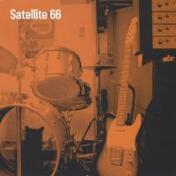 Satellite 66's mini-album Grasshopper sat around my apartment a long time without getting any play, and that's a shame...because the first time I put it on I was instantly hooked. The album's filled with snappy pop-rock anthems that you can turn up loud and drive across the country to, songs with persistent basslines and loose, circling guitar. Satellite 66's style fits more with the "college rock" of the mid-90s than what the kids of today are into ("Modern Rockin'", one of their song titles calls it; think Sebadoh, Pavement, GBV, Superchunk), but there's also nods towards surf rock ("J.P. Morgan," "Egg Roll"), slow dancing 50s-style ("Going Home"), and more, especially in the guitar licks. With two instrumentals and six songs with vocals, basically this is four guys blasting out melodic, energetic rock and roll songs and recording them at home for our enjoyment. Singer/guitarist/songwriter Josh Seib's spent some time in Brando (and has a somewhat similarly hushed style of singing), and the band also includes long-lost Poi Dog Pondering guitarist Ted Cho. Grasshopper is quick and completely pleasurable, with lots of great guitar sounds, some witty and heartfelt lyrics, and an overall mood of fun.
Satellite 66's mini-album Grasshopper sat around my apartment a long time without getting any play, and that's a shame...because the first time I put it on I was instantly hooked. The album's filled with snappy pop-rock anthems that you can turn up loud and drive across the country to, songs with persistent basslines and loose, circling guitar. Satellite 66's style fits more with the "college rock" of the mid-90s than what the kids of today are into ("Modern Rockin'", one of their song titles calls it; think Sebadoh, Pavement, GBV, Superchunk), but there's also nods towards surf rock ("J.P. Morgan," "Egg Roll"), slow dancing 50s-style ("Going Home"), and more, especially in the guitar licks. With two instrumentals and six songs with vocals, basically this is four guys blasting out melodic, energetic rock and roll songs and recording them at home for our enjoyment. Singer/guitarist/songwriter Josh Seib's spent some time in Brando (and has a somewhat similarly hushed style of singing), and the band also includes long-lost Poi Dog Pondering guitarist Ted Cho. Grasshopper is quick and completely pleasurable, with lots of great guitar sounds, some witty and heartfelt lyrics, and an overall mood of fun.
The Waxwings, Let's Make Our Descent (Rainbow Quartz)
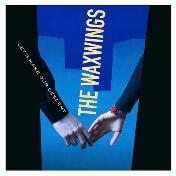 It's nice to see that not all bands from Detroit have fallen under the spell of either garage rock or the White Stripes. The Waxwings are still doing what they did on their first two albums - that is, they're looking to the past for inspiration, but not out of fashion or style interests but because there were rock bands in the past who cared about songcraft, who could deliver great melodies while rocking you up and down. Let's Make Our Descent is a very 1960s-sounding album, with clear nods to the Rolling Stones, an ongoing fascination with the sort of top-notch pop-rock anthems pioneered by the Beatles and the Kinks, and a touch of psychedelia. In that regard, they share a lot in common with the Canadian band Sloan. And herein lies the problem. While I will scream from the rooftops that you don't have to be doing something brand new to be a worthwhile band, there's still a point where an album makes you stop and think, "but haven't I heard this before? ...and wasn't it better the first time around?" As catchy as a few of Let's Make Our Descent's songs are (like the opener "Steady As Starlight," in particular), and as much as I admire a band playing straight-up rock without pretension, I just can't get past that deja vu feeling here, the sense that these songs were better the first few hundred times that I heard them, when they were written by someone else.
It's nice to see that not all bands from Detroit have fallen under the spell of either garage rock or the White Stripes. The Waxwings are still doing what they did on their first two albums - that is, they're looking to the past for inspiration, but not out of fashion or style interests but because there were rock bands in the past who cared about songcraft, who could deliver great melodies while rocking you up and down. Let's Make Our Descent is a very 1960s-sounding album, with clear nods to the Rolling Stones, an ongoing fascination with the sort of top-notch pop-rock anthems pioneered by the Beatles and the Kinks, and a touch of psychedelia. In that regard, they share a lot in common with the Canadian band Sloan. And herein lies the problem. While I will scream from the rooftops that you don't have to be doing something brand new to be a worthwhile band, there's still a point where an album makes you stop and think, "but haven't I heard this before? ...and wasn't it better the first time around?" As catchy as a few of Let's Make Our Descent's songs are (like the opener "Steady As Starlight," in particular), and as much as I admire a band playing straight-up rock without pretension, I just can't get past that deja vu feeling here, the sense that these songs were better the first few hundred times that I heard them, when they were written by someone else.
Copyright (c) 2005 erasing clouds |
|